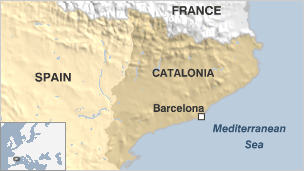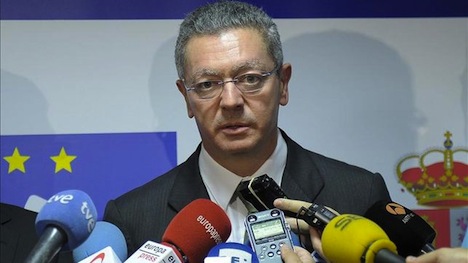It’s not like Spanish prime minister Mariano Rajoy didn’t have any warning.![]()
![]()
Catalan regional president Artur Mas called early regional elections for November 2012 for the express purpose of winning a mandate behind the call for greater autonomy and/or independence for Catalunya. That didn’t work out so incredibly well for Mas and his autonomist center-right Convergència i Unió (CiU, Convergence and Union), which lost 12 seats in the 135-member Catalan parliament, and was forced to form a unity government with the pro-independence, leftist Esquerra Republicana de Catalunya (ERC, Republican Left of Catalunya). Nonetheless, the election largely ratified the strength of the Catalan separatists, who control 87 seats to just 48 for Catalunya’s federalist parties. 
Three months ago, on September 11 — upon the celebration of Catalan national day — nearly 400,000 Catalan citizens formed a human chain stretching from the Pyrenees to the coast to emphasize just how fervently they support their right to self-determination.
Rajoy, much to his discredit, has ignored those Catalans, and Mas’s government has now set November 9, 2014 as the date for a referendum on Catalan independence — with or without the Spanish federal government’s blessing — after a vote last Thursday in the Catalan parliament that enjoyed the universal support of Mas’s Convergence and Union, the Republic Left and the Iniciativa per Catalunya Verds (ICV, Initiative for Catalonia Greens). Rajoy (pictured above) and his justice minister Alberto Ruiz-Gallardón (pictured below) have made clear that not only is a referendum unacceptable under the Spanish constitution, but that they won’t be coerced into negotiating with Mas over devolving greater power (and funds) back to Catalunya, one of the wealthiest regions in Spain. With over 7.5 million people, the region account for one-fifth of Spain’s economic output.
If the vote actually goes ahead next November (and there’s some reason to believe that Mas is bluffing), it could constitute the most severe constitutional crisis since Spain’s return to democracy in the late 1970s.
To some degree, it’s easy to sympathize with Rajoy. Though he took office just over two years ago when the center-right Partido Popular (the PP, or the People’s Party) ousted the center-left government headed by José Luis Zapatero and the Partido Socialista Obrero Español (PSOE, Spanish Socialist Worker’s Party) in November 2011, Rajoy’s popularity has plummeted as he’s pushed Spain through higher taxes and budget cuts. That fiscal adjustment is plausibly both the cause and effect of a cycle of economic depression that’s left Spain reeling, including an unemployment rate of 26.6% that may be peaking only after five years of GDP contraction. Spanish finances remain in tatters, despite the budgetary efforts of both the Zapatero and Rajoy governments, and Rajoy simply can’t afford to send more euros to Barcelona. It’s not difficult to see the slippery slope that would begin once Rajoy starts negotiating with Rajoy over Spanish federalism. An equally pro-autonomy regional government in Euskadi (Basque Country), which is also wealthier than the Spanish average, will be sure to follow with their own demands. Other regions, like Galicia and Andalusia, the latter one of Europe’s most economically forlorn, might also make demands for stimulus.
It’s equally easy to see the naked political game that Mas is playing. You need only look to the way that the referendum will be structured — Catalans will first be asked, ‘Do you want Catalonia to be a state?’ Those who agree with the first question will subsequently be asked, ‘Do you want Catalonia to be an independent state?’ The vote will be an easy way for Catalans to register their disapproval with Madrid without taking the kind of steps that could truly rupture Catalunya from Spain and that could leave Catalunya as an independent country outside the European Union (if only temporarily). Mas is clearly using the referendum as a game to strengthen his hand vis-à-vis negotiations with Rajoy and, perhaps, to maximize his own standing within the Catalan electorate. Some relatively moderate voices within the CiU coalition have even said that the referendum should only be held if it’s ultimately deemed ‘legal’ by Madrid. The shell game of posing two questions to determine whether Catalunya should be a state or an independent state conveniently blurs the line of independence — it’s such a cynical ploy that it’s hard to take Mas seriously as a statesman, despite the legitimate sentiment of millions of pro-independence Catalans.
But Mas can get away with such demagoguery largely because of Rajoy’s intransigence. It’s not surprising that Mas’s government scheduled the vote just seven weeks after the Scottish referendum on independence from the United Kingdom. In contrast to the current constitutional posturing in Spain, the agreement struck between British prime minister David Cameron and Scottish first minister Alex Salmond gives Scotland a bona-fide opportunity for independence without the two-faced game of multiple, convoluted referendum questions (i.e., the oddly constructed statehood referendum last November in Puerto Rico or the phrasing of Québec’s 1995 sovereignty referendum). The Scottish referendum reflects Cameron’s respect for Scotland’s right to self-determination, and polls consistently show that a majority of Scots are still opposed to breaking with three centuries of union with England. If Cameron (together with his own center-right Conservatives, the center-left Labour Party and his coalition partners, the Liberal Democratic Party) decisively win the September referendum, it could put the Scottish independence question to rest for a generation or longer. Cameron and his pro-union allies will have won the case for British union at the ballot box.
Instead, Rajoy is hiding behind the Spanish constitution in his refusal to allow a vote to the Catalans. By digging in his heels, he’s already forced Mas and the wide spectrum of Catalan regional parties to last week’s referendum vote. The People’s Party and its Catalan counterpart, the Partit Popular de Catalunya (PPC, People’s Party of Catalunya) are certain to oppose the referendum, and the PSOE and its federal leader Alfredo Pérez Rubalcaba remain almost as strongly opposed to a referendum. But even last week, cracks emerged within the PSOE’s respective Catalan counterpart, the Partit dels Socialistes de Catalunya (PSC, Socialists’ Party of Catalunya), which might not remains so united against a referendum if Mas plows ahead. Among the PSC’s 20 deputies in the Catalan parliament, only 15 voted against the referendum (another five were present at the time of last week’s vote, but chose not to vote — in defiance of the PSC leadership). Moreover, many international and European leaders, including Cameron, have called on Rajoy to acknowledge the Catalan right to self-determination.
The obvious path for Rajoy is to offer Madrid’s approval for a referendum — but not just any referendum. Rajoy should serve up the kind of vote that Cameron and Salmond have agreed for Scotland, a clear yes-or-no ballot on independence. No fudging the issue of whether Catalan can be a ‘state’ within Spain, no fudging the difference between sovereignty and independence. For the record, the Republican Left (unlike Mas’s Convergence and Union) supports such a straightforward, one-question referendum. If Catalans thereafter vote to leave Spain, Rajoy should let them leave. But even at a time of maximum economic stress (in Catalunya as well as in Spain), polls still show that Catalan voters don’t uniformly support independence.
Catalan regional identity runs strong, and Catalans have a unique culture, a unique language and a shared history of oppression during the dictatorship of Francisco Franco throughout the mid-20th century. While a September 2013 Cadena SER poll found that 52% of Catalans supported independence, 24% opposed it and another 24% were undecided, there’s plenty of evidence that shows more Catalans favor greater devolution within Spain than outright independence. A GESOP poll published over the weekend that posed the two referendum questions to voters found that 44% supported full independence, 36% opposed full independence (even if they believe Catalunya is a ‘state,’) and 17% remain undecided.
If anything, Rajoy’s refusal to allow a referendum has emboldened the unity among the Catalan advocates of greater autonomy and independence alike — holding a ‘Scottish-style’ referendum could conceivably fracture a coalition that today has an easy villain in Rajoy.
Rajoy could transform his status as a villain overnight — and put in place a means of ending Mas’s long line of attempts to blackmail Spain’s federal government — by accepting Catalunya’s right to self-determination and acceding to a referendum on his own terms.


2 thoughts on “In refusing Catalan vote, Rajoy risks isolating himself and Spain’s future”